- Home
- William Golding
Free Fall Page 17
Free Fall Read online
Page 17
But now to live with such a thing was unendurable. Nothing that Halde could do seemed half so terrible as what I knew myself. Was this thing common? Did I underestimate the privacies of the kings, would they too make such a showing? I did not think so then and I do not think so now. I knew one of them, Johnny Spragg, and I understood how there had been in him what had been missing in me; namely a natural goodness and generosity so that even his sins were peccadilloes because all the time the root of the matter was in him. But either I had been born without this natural generosity or I had lost it somewhere. The small boy trotting by Evie was nothing to do with me: but the young man waiting on the bike for the traffic lights to change from red—he and I dwelt in one skin. We were responsible the one for the other. So that when I thought back and came on the memory of Beatrice the beauty of her simplicity struck me a blow in the face. That negative personality, that clear absence of being, that vacuum which I had finally deduced from her silences, I now saw to have been full. Just as the substance of the living cell comes shining into focus as you turn the screw by the microscope, so I now saw that being of Beatrice which had once shone out of her face. She was simple and loving and generous and humble; qualities which have no political importance and do not commonly bring their owners much success. Like the ward for children, remembered, they shine. And yet as I remembered myself as well as Beatrice I could find no moment when I was free to do as I would. In all that lamentable story of seduction I could not remember one moment when being what I was I could do other than I did.
Oh, the continent of a man, the peninsulas, capes, deep bays, jungles and grasslands, the deserts, the lakes, the mountains and high hills! How shall I be rid of the kingdom, how shall I give it away?
If I could say with Nick Shales that the word freedom is a pious hope for an illusion I might accept the drag of all those half-dead days and not mind them. If I could say with Rowena Pringle only believe, might I not subside into some calming system of reward and punishment, profit and loss? But I know the taste of potatoes and I do not believe merely—I see. Or if I could only take the mud as mud, if I could only see people as ciphers and be bored by the average impact of a day! If I could only take this world for granted!
Somewhere, some time, I made a choice in freedom and lost my freedom. I lost nothing before the verger knocked me down; or perhaps that blow was like death and paid all debts. Between there, then and the boy on the bike, the young man—that was the whole time of the other school. There, somewhere there? Back among the flowers and smell of cloakrooms, among the exercise-books and savage emotions, back among the rewards and penalties, back with the sense of life going on like that for ever?
11
That school catered for both sexes. Mixed, officially, I can think of no other institution so rigidly divided. This division, however, was not forced on us. We created it ourselves from the very first day. In the first hours of awe, we sat by instinct, girls on the left-hand side of the classroom, boys on the right. A line was drawn then, and by our common consent was never broken. No boy, not even I, who still remembered the majesty of Evie’s hair-ribbons, could have sat among the girls. Had I done so the sky would have broken apart and fallen on us. We did our best to pretend that we went to a boys’ school; we understood that the pattern of education for us in our little country grammar school was dictated not by theoretic pedagogy but by economics. We were being done on the cheap and ought to be thankful for being done at all. So our gang warfare that rioted by the stream at the bottom of the playground was for boys only. Here, my anomalous position in the rectory gave me a rootless background so that I boasted in compensation—boasted with rudimentary feeling for the shape of our social pyramid that I was the rector’s son, sort of—and became unpopular. It was in the shadows of this unpopularity that I moved slowly into adolescence, when the skin is flayed off and a feather weighs like lead and pricks like a pin. I was at home nowhere. There was bed, but bed with the irrational fear of ghosts and horrors; so that at this time I discovered how to huddle up and pull out of the body that comfort which the world could not give. Gradually I learned to shortcircuit my own current and be sufficient, running myself down like a battery in one incandescent flash.
Under what sign in the sky did Sammy develop then? There were two of them. They loom now in my memory, the virgin and the water-carrier. They form an arch, not of triumph but of defeat, they are supporters to my shield, if anyone made me, they made me, spiritual parents, but not in the flesh.
She was the one who taught Scripture and various form subjects. She was the form mistress over us for a year, she was a middle-aged spinster with sandy hair and the beginnings of a sandy moustache and beard, she was Miss Rowena Pringle and she hated me partly because I was hateful and partly because she was hateful and partly because she had a crush on Father Watts-Watt—who had adopted me instead of marrying her—and who was slowly going mad. She had an exquisite niminy-piminy lady-like air. To see her find that she had a blot of ink on her finger—hand up, fingers tapping in a bunch at each other like a tiny, lily-white octopus—was to appreciate how hysterically clean a lady can be. She withdrew from anything that was soiled—not dirty, soiled—and her religious instruction was just like that. Her clothes were usually in tones of brown. In rainy weather she would come to school in a brown macintosh neatly belted, she would wear goloshes and gloves, and be protected over all by a brown umbrella with scallops and silk tassels. She would vanish into the women’s staffroom and presently appear in class, picking her way to her high desk, as delicately neat and clean as a chestnut. She wore pince-nez, gold rimmed with a fairy gold chain of almost invisible gold links that descended to the frilly lace on her bosom and was pinned there with a teeny-weeny gold pin. Near the pin there was the watery-gold glimmer of a cut topaz. She had sandy hair, a freckled, slightly fattened face that usually wore a smile of professional benevolence, as arranged and external as her clothes.
Miss Pringle never touched anyone. A good, solid clout such as the verger gave me, was not in her repertoire. You knew that for Miss Pringle to touch human flesh would be a defilement. Those white fingers, with the gold ring on the right hand, were private and set apart. She ruled, not by love but by fear. Her weapons were no cane, they were different, subtle and cruel, unfair and vicious. They were teeny, arch sarcasms that made the other children giggle and tore the flesh. She was a past-master of crowd psychology and momentum. She could give our giggles a touch at the right moment, wait, touch again, like a man with a pendulum, wait, touch, wait, touch until her victim was savaged by the storm of derision, was gasping for breath in the wretched flayed flesh—was on the hooks. And all the time she would be smiling her professional smile while the gold chain of her pince-nez flicked and twinkled; for, after all, it is a joy to practise one’s religion and be paid for it.
She need not have disliked me so much for I was with her. I was still innocent of the major good and evil; I thought no evil, I believed when she made me suffer that the fault was mine. I condemn her out of my adult stature. The flayed child that I was in her hands did not understand that truth is useless and pernicious when it proceeds from nothing but the mouth.
For I was with her. To me, these stories of good and wicked men, these stories where the scale is good and evil seemed the hub of life, the essential business. Agincourt was a great victory; but Jacob laid his head on a stone—I saw how hard it was and uncomfortable—and dreamed of a ladder of gold that reached into heaven. Watts invented the steam-engine; but a voice spoke to Moses out of a bush that burned and was not consumed away. Yes. I was with her.
For in that way she was a good teacher. She told her stories with the vivid detail you sometimes get from people who are frustrated mentally and sexually. It was years before I saw the stories of the Old Testament in any way but through her eyes. It was years before I saw how she had achieved the apparently impossible by bowdlerizing the stories and yet keeping their moral implications clear to us. My hand was always the
first up with an earnest question, my maps of the Holy Land were the most detailed, my illustrations of lightning flashing from Mount Sinai the most vividly realized. All would not do. My question was sure to turn into nothing but a dolly service to Miss Pringle who could ace me with a return as vivid as my own lightning; as for my maps, they were marked in such a way that her red ink contrived to ruin them.
I pry round my memories of this relationship. Did she perhaps know that I had spat, however dryly, on the altar? Did she resent my presence as a piece of slum-land that was in process of reclamation? Did she resent my living in the rectory? Did she perhaps divine intuitively what was unusual about Father Watts-Watt and credit me with his affection? Were we simply incompatible temperaments, the involved, frustrated spinster and the boy, tough—but now not so tough—simple and incredibly still innocent? What did I do that I should always be her target? Or can I place my hand on my heart and claim for once to be a blameless victim? Is there something that is not my fault? Certainly she was not always in such ordered control of herself. She was not invulnerable. She bore the curse of Eve like all women and with less stoicism than most. As time went on we found that she had occasional days when teaching was too much for her altogether. She would sit at her high desk, lolling back, eyes closed, rolling her head from side to side and sighing. Then, such was the force of her cruelty and discipline that we would not dare to sympathize or exploit—we were mouse-still all the period until the heavenly bell. It was almost a relief to return to her a day or so later and find her in control again, smiling and dangerous.
I see her with my fatal eye, I span the gulf. Her mouth is flapping open and shut. Is the electric light on? If only I could hear as well as see!
There is a chalk triangle on the board behind her, an irrelevant triangle. The lace is light brown, extends halfway up her neck. If I drove my elbow sideways I should hit Johnny Spragg in the ribs. Philip is in front of me and to the right. But this is not that sort of lesson, this is important, can be breath-taking. Moses.
I am deeply interested in Moses. He is more important than the composition of water. I am willing to be told about water when we get to Mr. Shales’s lesson but Moses is far more important. I want to know all about Moses that can be known. I know the story from infant school days, have had it here and there, till the plagues and all that are etched in me. But they—Miss Massey, pugilistic Miss Massey—they stop just where you want to know. His story turns into the story of the Israelites, that wearisome bunch who can be relied on to do the wrong thing. Perhaps Miss Pringle—I recognize her expertise—will not make this mistake, if it is a mistake. Perhaps she can fill in the gaps for me. I know that the Bible contains many laws that Moses is alleged to have ordained; but these, too, are irrelevant. What was that rock in which he was hidden, where the Lord passed by and covered Moses meanwhile with one hand? There should be as full an account of that end of his life as there is of the beginning. Perhaps—I think as the class settles itself—perhaps Miss Pringle who knows so much will let us into that secret. This, then, will be a real step up, a step forward; to be old enough for her to lift the curtains from that end of his life——
For she could lift curtains, could Miss Pringle. She told us why the veil of the temple was torn at the crucifixion, told us directly and explicitly why it was torn not transversely nor destroyed but torn from the top to the bottom. This was deeply satisfactory; and sometimes she did the same for Moses. We understood the relationship between the speaker Aaron and the seer Moses by the time she had finished with us. Yet she would mix this profound exegesis with matter that was useless and even distressing. I would sit in my desk, and wonder why when she could speak so deeply to us, she could also say such cheap and silly things, like the Red Sea sometimes being parted—the waters driven back—by the wind; or snakes being cataleptic like lobsters when you stroke them or chicken at a chalk line; and therefore the rods thrown down were not a plain and lovely miracle but explicable, if you leant over backwards.
And Moses came to the mountain, even to Horeb.
Flap, flap, twinkle from the spectacles, watery glimmer of topaz——
I cannot hear her.
You did these things to me. In some ways you were wise; but you were cruel. Why can I not hear you? You did these things, you said the words that have vanished. They did not go into the air and die; they sank into me deep, they have become me, they are so close to me I cannot hear them. You said them and passed on, you were preoccupied with your own affairs. Will you not stand to them? Is the world truly what the world looks like to the outward eye, a place where anything goes if you can get away with it?
Flap, flap, twinkle.
There were three ways she might have taken. She might have explained that there is a kind of bush in the desert which burns for a very long time and sometimes catches fire in the sun.
No.
Flap flap.
She might have told us that Moses saw this with the eyes of the spirit. There was no bush to the outward eye; and only to dwell on this bush—for bush will do as well as any other word—only to dwell, is to find it expanding, filling all space and being, taking fire with colours like the rainbow.
Flap——
“I am sure you have all heard this part of the Bible before. So I shall ask you some questions about it. After all you are supposed to be a little wiser now than you were a year ago. Mount Horeb. What did Moses see on Mount Horeb?”
“A bush, miss, a burning bush’n the Angel of the Lord spoke out of the bush ’n——”
“That will do. Yes. Was there anyone in the bush?”
“Miss! Miss! Miss!”
“Wilmot? Yes. Did Moses ever meet him again?”
“Miss! Miss!”
“Jennifer? Yes. On Mount Sinai. Did he see clearly?”
“Miss!”
“Of course not. Even Moses had to be content with ‘I am that I am’.”
“Miss! Miss!”
“What is it, Mountjoy?”
“Please, miss, ’e knew more’n that!”
“Ah——”
I knew then what a fool I was; I knew that if explaining myself to Father Watts-Watt was impossible it was dangerous with Miss Pringle. How could I say—of course you know, too, I am only reminding you or perhaps you were only pretending so that one of us would please you by giving more than a dull agreement—but I was too late.
Miss Pringle spread a delighted beam over the class and invited them to share with her the enjoyment of this captive.
“Mountjoy is going to tell us something we do not know, children.”
There was, as she knew, a little ripple at that. She took the ripple just before it had died away.
“Mountjoy knows the Bible better than we do, of course. After all, he lives very near the church.”
The pendulum began to swing.
“Silence for Mr. Mountjoy, children. He is going to explain the Bible to us.”
I could see how red my nose was getting.
“Well, Mountjoy? Aren’t you going to give us the—scholarly results of your researches?”
“It was later on, miss, after ’e’d——”
“He’d, Mountjoy, not ’e’d. I’m sure the rector wants you to improve your accent as quickly as possible. Well?”
“’E—He wanted to see, miss, but it would ’ve been too much for—him.”
“What are you talking about, Mountjoy?”
“Miss, Moses, miss.”
Now the laughter flailed. There were cries of Miss Moses that Miss Pringle allowed to increase just this side of riot.
“It was after, miss.”
“After?”
“It would ’ve been too much. So he was hid in a crack in the rock ’n ’e—he saw ’is backparts it says, miss, an’ I was going to ask you——”
“What did you say?”
Now I was conscious of the silence, shocked off short.
“It says ’e saw——”
“When did you read th
at?”
“It was when you told us to learn the, learn the——”
“That was the New Testament lesson, Mountjoy. Why were you looking at the Old?”
“I’d finished, miss, ’n I thought——”
“So you’d finished? You didn’t say so. You didn’t think to tell me and ask my permission for this, this——”
The topaz shook and glittered.
“Very well, Mountjoy, so you’d finished your verses. Say them.”
But next to my mind as I stood, blinded and dumb in the desk was the picture of this event as a journey on the wrong track, a huge misunderstanding.
“It was jus’ that I wanted to know, miss, the way you said about the veil and all that——”
“Say them!”
The blackness of torment turned red. There were no words on my tongue.
“Say them, Mountjoy. ‘Blessed are the——’”
Don’t you understand? I’m on your side, really. I know that the openings are more important to you than the silly plausibilities of explaining away. I know that the book is full of wonder and importance. I am not like Johnny on my left who will take it as read, or Philip in front who is looking at you and wondering how he can learn to use you. My delight is your delight.
Miss Pringle shifted her hand forward to another manual. Here was vox humana. We heard this voice sometimes, her wounded voice, voice of Rachel weeping for her children, always the prelude to savagery.

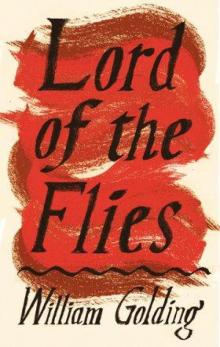 Lord of the Flies
Lord of the Flies To the Ends of the Earth
To the Ends of the Earth Free Fall
Free Fall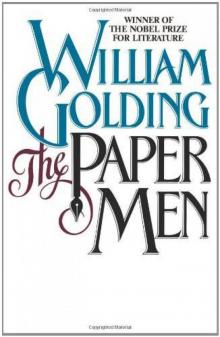 The Paper Men
The Paper Men The Spire
The Spire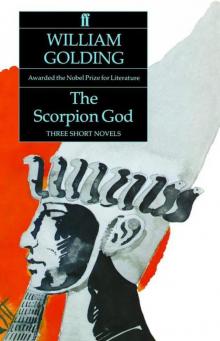 The Scorpion God: Three Short Novels
The Scorpion God: Three Short Novels The Inheritors
The Inheritors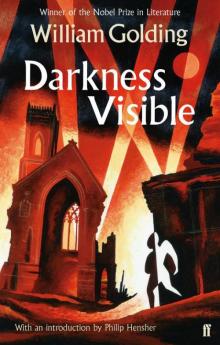 Darkness Visible: With an Introduction by Philip Hensher
Darkness Visible: With an Introduction by Philip Hensher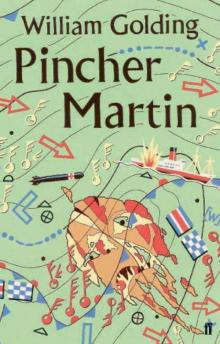 Pincher Martin
Pincher Martin The Pyramid
The Pyramid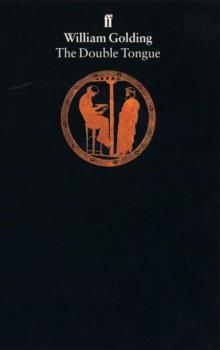 The Double Tongue
The Double Tongue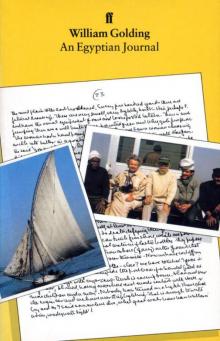 An Egyptian Journal
An Egyptian Journal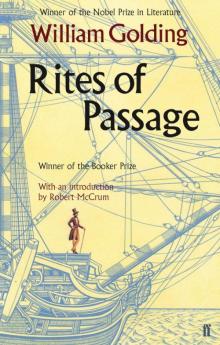 Rites of Passage
Rites of Passage Envoy Extraordinary
Envoy Extraordinary